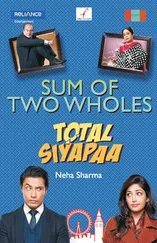The note said, "Come see me when he goes." It was unsigned, but the writing was in Mr. Gupta's elegant hand.
"From? From?" said Mr. Bajwa to the peon. The peon left without answering.
"Mr. Gupta?" asked Mr. Bajwa. I could not think of anyone else to name and so nodded yes. He looked above my head and cleared his throat. "What didn't I do for him?"
All this sadness made me think it might be easy to go insane. I wondered if insanity was like being drunk.
"I need kindness," Mr. Bajwa said.
A little later Mr. Mishra stood, announced, "I am going home to sleep," and departed.
Mr. Bajwa's gaze fell back on me. I was too ashamed to look away. After a moment he began singing a movie song: "Oaths, promises, love, loyalty. Words only. What can you do with words? Nobody is anybody's." He did not sing it well, somehow even getting the rhymes slightly off A cheery laugh started in me. The laugh, along with a need to pray, had begun visiting me in my dark room. I imag-
ined interrupting Mr. Bajwa to tell him that he was pitching his voice incorrectly, and then I would start to sing the song and make him try to copy me. "When everything has turned to dust…" Several times Mr. Bajwa forgot the words and just hummed the tune. As I laughed, I also started panicking. I became cold. The chill was a new symptom. I was beginning to find my symptoms comforting. "Please, Mr. Bajwa," I murmured. "You were not innocent." Mr. Bajwa, still singing, got up and walked to the window behind me. He pulled the curtain aside slightly and looked out. He finished the song and began it again. This time he remembered more of the lyrics. As he sang, he walked around the room, moving close to the wall. When he reached the door, he opened it and left.
Mr. Gupta's office is at the end of a gallery that is open to the sun on one side. As I went to him, I wondered what would happen to me if the BJP won. There was probably a note in the BJP's files on Mr. Gupta and the money I helped him arrange for Congress. They might try using him to raise money for them. Opposition parties are always hungry for bribes. But the BJP might decide they wanted someone without a complicated history. Any bookkeeper could look at our registers and see that our numbers were gibberish. No matter who won, it was unavoidable that over the next few months several people in our building would face investigations. The sheer activity of a campaign leads to paperwork that, once initiated, takes on its own existence.
Fear stirred in me and it felt like sadness. I stopped and looked out at the dirt courtyard. The wind was sliding sheets of dust back and forth across the yard. My emotions over the last few days had become undifferentiated. Horror could come as chuckling or as grief Love might be like anger. Above all this was the certainty that I would be punished. A BJP victory could be a way for this to occur.
I knocked on Mr. Gupta's door. He called out that it was unlocked. Mr. Gupta was wearing a deep blue T-shirt and a file was
open before him on his desk. His room, more than that of any other officer of his grade, looked as if it belonged in a private house. The walls were lined with bookcases. A light blue carpet with geometric patterns covered the floor, and instead of an enormous air cooler stuck in the window exhaling mildew, he had a small air conditioner. His windows were washed each week, and the light they let in was fresh.
I closed the door. I wondered whether he had summoned me because of how I had behaved at the wedding reception. The relative unimportance of this struck me as amusing. Nervousness made me repeat Ram Ram Ram in my head. Even God's name was amusing.
Mr. Gupta nodded to a chair and, once I sat down, said, "Tell me about the money."
"We have fourteen hundred and eighty-two thousand in twenty-three accounts. I am nearly done with my list of givers. There are one or two big ones left and some small ones." As I spoke, a smile unfurled across Mr. Gupta's face. The smile reached the sides of his cheeks and stiffened so that he appeared dazed. For him to take such personal pleasure was unusual, and I knew that some punishment, vicious and complete, was imminent. "Maybe we'll have a little over twenty-two lakhs by the end."
For a moment after I stopped talking, Mr. Gupta kept smiling and staring at me. "Twenty-two lakhs." I noticed his handsomeness, his exactly curved lips.
"Are you political, Mr. Karan?" he asked.
"No."
"Who will win the election?" The question was presented in an abrupt interrogatory style. Mr. Gupta and I almost never talked politics, and I wondered what he was testing for.
I thought about this for a minute and then said the obvious. "The BJP won't win a majority. Their power is in the Hindu belt. Congress can't win a majority either. They've lost too much ground the last few years. But if they want to rule, they can form a coalition."
"Can't the BJP form a coalition?"
"It's difficult to compromise when you are so extreme." The
BJP's leader, Advani, had recently begun seeking the destruction of the Babri mosque, claiming God Ram had been born there.
"Will the BJP win the cities?"
I wondered at the interrogation. "That's where they are strongest."
"Why?" Mr. Gupta asked, and as I tried reasoning this through, he began laughing. Then he leaned across his desk, and for a moment I thought he was going to take my hands. "Some people from the BJP came to me a few days ago. They asked if I wanted to stand for Parliament from Delhi." He laughed again.
I couldn't believe he would betray Congress, so I felt awe instead of fright. I had always known Mr. Gupta was much more widely and deeply connected than my work for him indicated. He had the type of personality that made people, older and more powerful people than he, ask his advice. But for a major party to ask Mr. Gupta to represent it was like one of my relatives who had bought a medical license discovering the cure for some baffling disease.
"The news isn't that good, though," Mr. Gupta said, leaning back in his chair and putting his hands on his stomach. His smile became wry and self-mocking. "Advani was going to run for Parliament in two districts. One from Delhi. Insurance that if for some reason he lost in one district, he might still win in the other. Now Congress is standing Rajesh Khanna against him in Delhi, and even Advani doesn't want to go against a movie star." Mr. Gupta's smile vanished. He removed his hands from his stomach. "Nobody wants to go against Rajesh Khanna. Also, the BJP wants someone who can bring his own money to the campaign. Anybody who has money already wants easier competition."
At first I didn't understand what money he was talking about. "Your family's money?" I asked, though I was not certain Mr. Gupta came from a rich family. "Congress's money!" The fact that he appeared to be considering cheating Congress filled me with terror. There were men I had met who would come for us with guns if Mr. Gupta went on. A decade ago, a man in our office building who collected for Congress had embezzled some of what he had raised. His
body was found in the water tank on the roof of the building he Hved in. I knew Mr. Gupta thought he was invulnerable. "You can't win against Rajesh Khanna."
Mr. Gupta raised his hands a few inches into the air, turned them palms up, and brought them down onto the arms of his chair. The injustice of this shrug converted my panic to anger.
"You can't win," I said. I thought of turning him over to Congress, but then the BJP might take revenge.
"If Sonia Gandhi runs, I can't win."
"Think what it means when the president of the BJP doesn't want to run against someone."
"Advani probably would have won. Rajesh Khanna hasn't had a hit movie in ten years."
"Who knows your name? Most of the people in this building don't know you."
Читать дальше












